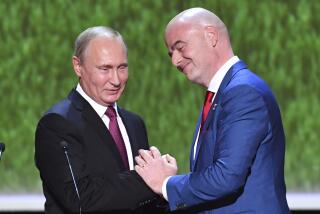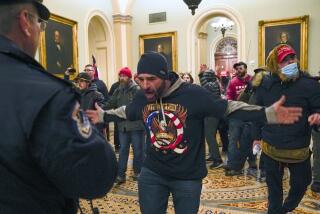The soccer Nazis’ losing battle
- Share via
‘TWO WORLD WARS and one World Cup!” goes a favorite chant of English soccer fans whenever their team faces Germany. French fans wear the Phrygian caps of the revolutionaries of 1789, while their Swedish counterparts prefer horned Viking helmets.
Still, although Europe’s soccer fans imagine their World Cup teams as bearers of a heroic past, many of the players have little connection to that past. Seven players on England’s squad are of African descent. All but two members of the French starting lineup are of African or Arab origin. Even Sweden’s attack is led by one man whose father came from West Africa and another of Bosnian-Croat extraction.
Because soccer is a leading indicator of Europe’s increasingly cosmopolitan character, it’s hardly surprising that right-wing anti-immigration politicians find little to love about the World Cup.
When his country won the tournament in 1998, the racist politician Jean-Marie Le Pen complained that the champions were “not a real French team.” (Presumably, the millions of citizens who took to the streets in celebration didn’t agree.) Now, German neo-Nazis have threatened to disrupt the World Cup, reserving special venom for the two players of African origin on Germany’s team.
Although players of color have graced Europe’s top leagues since the 1970s, and there’s hardly a championship team anywhere without some Brazilian or African imports, an astonishing level of racism persists among some fans and even coaches.
Ukraine coach Oleg Blokhin, for example, recently complained that the influx of foreign players deprived his compatriots of role models: “Let them learn from [our players] and not some Zumba-Bumba whom they took off a tree, gave two bananas and now he plays in the Ukrainian league.”
Then there was Spain’s coach, Luis Aragones, caught on TV telling striker Jose Antonio Reyes that he was better than his French Arsenal teammate Thierry Henry. Except Aragones didn’t say Henry’s name; he used a vicious racial epithet.
In Spain, Italy and Eastern Europe, black players regularly suffer racial abuse in the form of ape noises and bananas thrown from the stands.
Although the penalties aren’t always as strong as they ought to be, FIFA, the sport’s governing body, has made combating racism a priority.
But the racism in question does not originate at soccer stadiums. A game whose ability to stir national and tribal passions is rivaled only by war is a natural rallying point for right-wing backlash on a continent struggling to integrate millions of immigrants.
A World Cup tournament easily accessible to members of the lumpenproletariat, in which Germany’s neo-Nazi movement breeds, offers plenty of opportunity for violent acts of political theater to advance their hateful cause -- that’s if they can avoid the “Fight Club” temptation to brawl with the like-minded thugs among the English, Polish, Serb and other fans.
As vile as their presence may be, it’s worth remembering that what’s happening on the field gives little comfort to the racists; instead, it is deeply threatening to them. The state of soccer today invites Europeans to re-imagine their national identities in more inclusive terms.
The most universally loved team today is Brazil, and part of its appeal may be its image of a totally unselfconscious racial harmony -- nobody would dream of counting the number of black or white players on Brazil’s team.
In South Africa, where I grew up, soccer offered a glimpse of an uncomplicated, nonracist future long before apartheid fell. During the 1988 state of emergency, the only white people entering Soweto were a handful of furtive revolutionaries helping the liberation struggle, hundreds of riot cops in armored vehicles and a dozen or so young soccer players from racist blue-collar neighborhoods who now earned their living playing for the black teams that dominated the national league.
Where soccer led, society eventually followed. And it’s the fear of that possibility that draws the Nazis to soccer grounds. But no matter how shrill their theatrics, they are a sure sign that, on the soccer field at least, the good guys appear to be winning.
More to Read
Go beyond the scoreboard
Get the latest on L.A.'s teams in the daily Sports Report newsletter.
You may occasionally receive promotional content from the Los Angeles Times.







